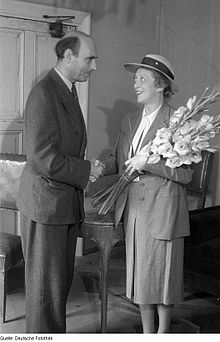Gustav von Wangenheim
Gustav von Wangenheim | |
|---|---|
 | |
| Born | Ingo Clemens Gustav Adolf Freiherr von Wangenheim 18 February 1895 |
| Died | 5 August 1975 (aged 80) |
| Spouse(s) | Inge von Wangenheim (née Franke), 1931–1954 |
Gustav von Wangenheim (born Ingo Clemens Gustav Adolf Freiherr von Wangenheim; 18 February 1895 – 5 August 1975) was a German nobleman, actor, screenwriter and director.
Life
Wangenheim was born Ingo Clemens Gustav Adolf Freiherr von Wangenheim in Wiesbaden, Hesse, to parents Eduard Clemens Freiherr von Wangenheim and Minna Mengers. Both of his parents were performers; his father, who used the stage name Eduard von Winterstein, appeared in over 200 films between 1910 and 1960.[1]
Wangenheim made his screen debut in 1914 in Passionels Tagebuch and went on to star in many silent features. Among his works were Fritz Lang's early science fiction film, Frau im Mond (as "Windegger"), and Karl Heinz Martin's Das Haus zum Mond. In 1921, Wangenheim was cast in what would prove to be his most enduring role, that of Thomas Hutter (Jonathan Harker) in F. W. Murnau's Nosferatu.
A member of the Communist Party of Germany since 1921, Wangenheim founded the Communist theatre company Die Truppe '31 in 1931.[2] Die Truppe '31 produced three plays, authored and directed by Wangenheim, before it was shut down by order of the Nazi regime in 1933.[3]
Wangenheim fled Nazi Germany in the 1930s and found refuge in the Soviet Union. While living in exile at Moscow's Hotel Lux, he continued writing and producing movies, such as Der Kampf (1936), an anti-Nazi protest film, and was the head of the German language Cabaret "Kolonne Links". In 1936, during the Stalinist purges, he denounced his colleagues Carola Neher and Anatol Becker as Trotskyites.[4]
Becker was executed and Neher died in the Gulag system after five years in prison.[5] Von Wangenheim's son later stated the accusations that his father denounced Neher and Becker were one-sided and inaccurate. Gustav von Wangenheim's son claimed his father, after being arrested by the NKVD and a lengthy interrogation, signed a statement that implicated Carola Neher as being "anti soviet" but had in fact explicitly refuted the accusation that Neher and her husband Anatol Becker had planned to murder Stalin.[6]
Wangenheim was a founding member of the National Committee for a Free Germany. After World War II, he returned to East Germany, where he worked for the DEFA as screenwriter and director.

Wangenheim was married to Inge von Wangenheim, née Franke, from 1931 to 1954, when the marriage was annulled. The couple had one son, Friedel von Wangenheim, and 2 daughters, the twins Elisabeth and Eleonora von Wangenheim. Wangenheim died in East Berlin on August 5, 1975 and is buried in the Friedrichsfelde cemetery in Berlin.
Filmography
- 1955: Heimliche Ehen (director/writer)
- 1955/1956: Lied über dem Tal (director)
- 1953/1954: Gefährliche Fracht (director)
- 1949: Der Auftrag Höglers (director/writer)
- 1948: Und wieder 48 (director/writer)
- 1936: Der Kampf (director/writer)
- 1931: Danton
- 1928/1929: Woman in the Moon
- 1923: Schatten - Eine nächtliche Halluzination
- 1922: Das Feuerschiff
- 1922: The Pilgrimage of Love
- 1922/1923: The Stone Rider
- 1921: Nosferatu, eine Symphonie des Grauens
- 1920: Das Haus zum Mond
- 1920: Der Tempel der Liebe
- 1920: Kohlhiesel's Daughters
- 1919: Die Welteroberer
- 1919: Kitsch. Tragödie einer Intrigantin
- 1919/1920: Romeo und Julia im Schnee
- 1918: Ferdinand Lassalle
- 1917: Die Erzkokette
- 1916: Das Leid der Liebe
- 1916: Homunculus. 3. Teil: Die Liebestragödie des Homunculus
- 1914: Passionels Tagebuch
References in popular culture
- In the 2000 film Shadow of the Vampire, which depicted the production of Nosferatu, Eddie Izzard portrayed Wangenheim.
- Footage of Wangenheim's performance as Hutter appears in the Queen video for "Under Pressure."
References
- ^ Eduard von Winterstein
- ^ In a Cold Crater
- ^ Stefan Wolpe: Biography and Much More from Answers.com
- ^ Hans Schoots, Living Dangerously - A Biography of Joris Ivens
- ^ Reinhard Müller "Menschenfalle Moskau. Exil und stalinistische Verfolgung" Hamburg 2001 Template:De icon
- ^ Vgl. Friedel von Wangenheim: Mein Vater Gustav Frhr. v. Wangenheim und der Fall der Schauspielerin Carola Neher, in: Wangenheim Nachrichten Nr. 25 vom Dezember 1998.
External links
- 1895 births
- 1975 deaths
- Barons of Germany
- People from Wiesbaden
- Communist Party of Germany politicians
- Socialist Unity Party of Germany members
- German anti-fascists
- German communists
- German male film actors
- German film directors
- German-language film directors
- German male silent film actors
- Refugees from Nazi Germany in the Soviet Union
- National Committee for a Free Germany members
- 20th-century German male actors
